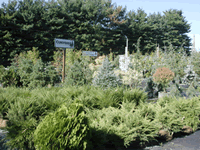Representing almost 40 percent of the state's agricultural production with more than $297 million in cash receipts, the horticultural industry is New Jersey's leading agricultural sector.
However, the industry witnessed a slowdown in consumer purchases last year due to a combination of drought conditions, strict water regulations and a sluggish economy.
In addition, New Jersey's growers face fierce competition from Canada, where the cost of energy used to heat greenhouses is significantly lower.
To increase demand for New Jersey nursery stock, the New Jersey Department of Agriculture is adding horticultural crops to the Jersey Fresh marketing program. Retail nurseries and garden centers are already listed on the Jersey Fresh website and a "Fall is for Planting" marketing program ran in early October 2002. The Department currently conducts the Jersey Fresh quality inspection program for cut flowers produced in the state.
The Department also inspects and certifies nurseries, enabling growers to sell certified disease-free material in and out of state, and conducts seed certification and seed control testing programs to ensure high quality turfgrass seed for New Jersey sod growers.
In keeping with the goals outlined in its strategic plan, the Department continues to identify strategies to ensure the economic viability of the state's horticultural industry as well as the agricultural industry as a whole.
STRATEGIES
- Improve State and Public Contract Requirements
- Encourage state agencies, including the Department of Transportation through its highway planting program and the Department of Environmental Protection through its forestry program, to use New Jersey produced products whenever possible and ensure that all products meet the pest free standards of the New Jersey Nursery Law and satisfy the quality standards set by the American Nursery and Landscape Association.
- Lead in the use of Jersey produced plant material in bioengineering and cost share projects supported by the Soil Conservation Service.
- Encourage state agencies, including the Department of Transportation through its highway planting program and the Department of Environmental Protection through its forestry program, to use New Jersey produced products whenever possible and ensure that all products meet the pest free standards of the New Jersey Nursery Law and satisfy the quality standards set by the American Nursery and Landscape Association.
- Promote Environmental Efficiency Incentives
- Help facilitate the use of renewable energy sources to lower input costs and improve profitability.
- Promote the availability of grants for water recycling and other conservation activities that would help protect the environment and improve profitability.
- Study the feasibility of locating greenhouse facilities on brownfield sites.
- Help facilitate the use of renewable energy sources to lower input costs and improve profitability.
- Develop an Industry Recognition Program
- Explore the feasibility of creating a program that recognizes the outstanding use of nursery material grown and used in the state. A comprehensive award program that promotes both growers and end users of nursery products will create increased awareness of the ornamental horticulture industry in the state.
- Explore the feasibility of creating a program that recognizes the outstanding use of nursery material grown and used in the state. A comprehensive award program that promotes both growers and end users of nursery products will create increased awareness of the ornamental horticulture industry in the state.
- Increase Consumer Awareness
- Work to establish a Jersey Grown brand name, enabling the industry to benefit from a common trademark that identifies their products as locally grown. Once established, usage of a Jersey Grown logo will be facilitated and promoted by the Department.
- Develop fact sheets to educate and inform consumers about the availability, variety and use of Jersey Grown horticultural products.
- Continue to include horticultural crops in the Jersey Fresh marketing program.
- Maintain the retail nurseries and garden center listings on the Jersey Fresh website and continue seasonal marketing programs, such as Fall is for Planting.
- Work to establish a Jersey Grown brand name, enabling the industry to benefit from a common trademark that identifies their products as locally grown. Once established, usage of a Jersey Grown logo will be facilitated and promoted by the Department.
- Continue Quality Control Efforts
- Consider expanding the Jersey Fresh quality grading program for cut flowers produced in the state.
- Continue inspection and certification programs.
- Consider expanding the Jersey Fresh quality grading program for cut flowers produced in the state.
- Support Research
- Encourage the New Jersey Agricultural Experiment Station to continue its research in identifying new varieties of agricultural products that are resistant to pests and diseases and in identifying and developing new methods of pest control.
- Encourage the New Jersey Agricultural Experiment Station to continue its research in identifying new varieties of agricultural products that are resistant to pests and diseases and in identifying and developing new methods of pest control.
- Assist in Addressing Labor Issues
- Continue the commitment to programs that support worker training, keep workers healthy and safe, and address issues such as farm labor housing.
- Support reform of policies and procedures addressing temporary agricultural worker visas at the federal and state level.
- Encourage farmers to take a pro-active approach to learning about their responsibilities at both the federal and state levels to ensure worker safety.
- Continue the commitment to programs that support worker training, keep workers healthy and safe, and address issues such as farm labor housing.



